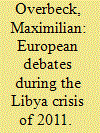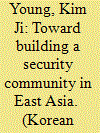|
|
|
Sort Order |
|
|
|
Items / Page
|
|
|
|
|
|
|
| Srl | Item |
| 1 |
ID:
157760


|
|
|
|
|
| Summary/Abstract |
Recent security challenges in East Asia have provided an opportunity to realize the
need for community building as a way of detouring military deadlock. This paper
suggests two principles of community building in East Asia: (1) identity balanced
by interest, and (2) an Asia of citizens beyond an Asia of states. These principles can
be applied to the community building sub-areas of politico–economic, security, and
sociocultural cooperation. The author examines the following topics accordingly:
(a) an invalid concept of the “Asian paradox” and the statement made by Japan’s
prime Minister Shinzo Abe in the politico–economic area; (b) the Helsinki Accord
and the EU Global strategy with their implication for East Asia in the security area;
and (c) the Campus Asia program and the Asian Human Rights Court as a means to
encourage sociocultural cooperation. With its complicated history of animosity and
low levels of intraregional trade, fostering a shared identity and finding common
interests in East Asia is no easy task. If some identities are given and others are
chosen, it is important to manage the negative effects of identity and encourage the
positive influence of its chosen dimensions.
|
|
|
|
|
|
|
|
|
|
|
|
|
|
|
|
| 2 |
ID:
150990


|
|
|
|
|
| Summary/Abstract |
This study compared the effects of three interventions and a no-intervention control on the settlement of resource and value conflicts. These variables were arranged in a two (conflict issue: resources vs. values) by four (no intervention vs. other affirmation vs. shared identity vs. transaction costs) between-dyads design in which 127 dyads engaged in a negotiation task. Negotiators reached generally lower joint outcomes in the value conflict compared to the resource conflict, but after the other-affirmation intervention, this pattern was reversed. The shared-identity intervention did not result in higher joint outcomes for value conflicts. Stressing positive concern for the other negotiator may be a more effective strategy than stressing commonalities between the parties: increased concern for self and decreased defense of own opinions may account for this result. Forcing and logrolling behavior are shown to be mediating variables between the type of conflict and outcomes.
|
|
|
|
|
|
|
|
|
|
|
|
|
|
|
|
| 3 |
ID:
134073


|
|
|
|
|
| Publication |
2014.
|
| Summary/Abstract |
The war in Libya of 2011 is generally portrayed as yet more evidence of the European Union (EU)'s inability to formulate a coordinated foreign policy. While the crisis took place in the EU's backyard, joint foreign policy action was hindered by member states' disagreements on whether or not to establish a no-fly zone in Libya. While this is true of political decision-makers, this paper investigates whether governmental decisions were reflected in similar divisions in national news media or whether references to European identity and criticism of European disunity transcended national media boundaries. Comparing a total of 6746 newspaper articles from Germany, France, the UK, Austria and the USA, the findings show that intergovernmental differences did not lead to similarly divided public spheres. Public debates in France, Germany and Austria constantly referred to a European foreign policy identity, though EU identity references were largely absent from UK newspapers.
|
|
|
|
|
|
|
|
|
|
|
|
|
|
|
|
| 4 |
ID:
125112


|
|
|
|
|
| Publication |
2013.
|
| Summary/Abstract |
Using a simulated bilateral negotiation over several security issues, the authors explore how variations in the negotiation context influence reactions to a negotiating crisis. Negotiators were primed to focus on one of three aspects of the context: transaction costs, dependence, or shared identity. They were asked to respond to the crisis with a decision to reach an immediate agreement, continue negotiating, or reframe the issues. The results showed that mutual dependence (unattractive alternatives) led to reframing (turning points) whereas high transaction costs led to a preference for continuing the negotiation. Shared identity did not affect negotiators preference across alternative courses of action. Affective trust amplified the impact of dependence and transaction costs: the decision to reframe was made more often by negotiators who reported low affective trust, whereas the decision to reach immediate agreement was made more often by negotiators who reported high affective trust. High cognitive trust encouraged negotiators to continue the negotiation if they had a shared identity or if transaction costs were high. Applications were made to real-world cases and implications were developed for Relational Order theory and for further research.
|
|
|
|
|
|
|
|
|
|
|
|
|
|
|
|
| 5 |
ID:
125254


|
|
|
|
|
| Publication |
2013.
|
| Summary/Abstract |
Despite the high-level economic interdependence and cultural exchange among major regional actors, the current security environment of Northeast Asia is rather volatile. The tension surrounding North Korean military aggression, the Taiwan Strait, and the East/South China Sea indicates the necessity of a security mechanism that restrains the aggressive actions of the regional actors involved. One viable option is to build a security community within which member states share an expectation of settling their differences through peaceful means. Based on an examination of the current state of security cooperation among South Korea, China, and Japan, this paper argues that the main impediment to a sustainable regional security community has been identity conflict caused by the history disputes among the three countries, not the lack of institutional settings or U.S. support. Shared identity and the concomitant mutual trust are prerequisites for genuine security cooperation. Therefore, this paper suggests the reconciliation process between South Korea and Japan as the initial step toward building an East Asian security community, paying attention to its implications for South Korea-China- Japan reconciliation.
|
|
|
|
|
|
|
|
|
|
|
|
|
|
|
|
|
|
|
|
|